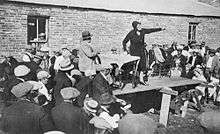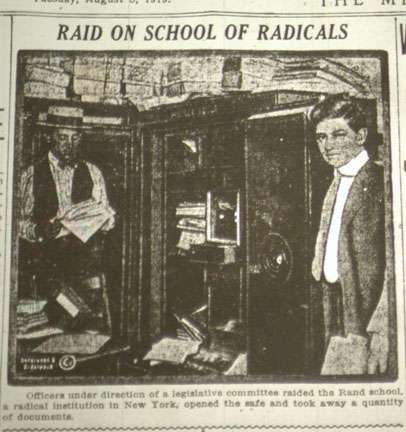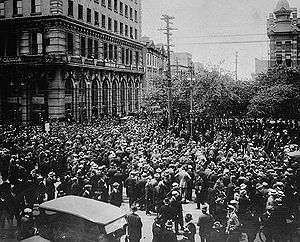Annie Buller

Annie Buller (9 December 1895 – 19 January 1973), also known as Annie Buller-Guralnick, was a union organizer as well as co-founder of the Communist Party of Canada (CPC) and manager of many CPC publications.[1]
Background

Annie S. Buller was born on December 9, 1895 (or some time in 1896), in Ukraine to a family with three brothers. Her father was a carpenter. She emigrated to Montreal with her parents in the early 1900s. She became politically active in socialist politics during World War I and followed her friend Becky Buhay (1896–1953) to study Marxist thought at the Rand School of Social Science in New York. In May 1920, Algernon Lee, educational director, presided over the graduation of the second-largest class ever at Rand, whose members included: John J. Bardsley, William D. Bavelaar, Annie S. Buller, Louis Cohan, Harry A. Durlauf, Clara Friedman, Rebecca Goldberg, William Greenspoon, Isabella E. Hall, Ammon A. Hennsey (Ammon Hennacy), Hedwig Holmes, Annie Kronhardt, Anna P. Lee, Victoria Levinson, Elsie Lindenberg, Selma Melms, Hyman Neback, Bertha Ruvinsky, Celia Samorodin, Mae Schiff, Esther T. Shemitz, Nathan S. Spivak, Esther Silverman, Sophia Ruderman, and Clara Walters.[1][2][3]

While at Rand, Buller helped raise funds in New York for Canadians in the Winnipeg General Strike.[1]
Career
By age 13, Buller was working in a tobacco factory, 12 hours a day, 6 days a week. By the age of 16, she had become a clerk in a "five and dime store." By age 17, she had a job in Almy's Department Store, where she became head buyer of china and glassware. With Buhay, she became involved in a Socialist youth group.[1]
Montreal Labour College
In 1920, on her return to Montreal from the Rand School in New York City, Buller, Buhay, fellow Rand student Bella Gauld (1878–1961), and others founded the Montreal Labour College. They modeled the school on the Rand School and the British Plebs League. The start-up committee comprised: Buller, Becky Buhay, Becky's brother Mike Buhay, Bella Gauld, a Mrs. Frankel, Mike Garber of the Revolutionary Communist Party of Canada (CPR), Nathan Mendelssohn, George Lloyd, Dick Kerrigan, Bill Long, and Sylvia Robertson. Visiting professors included Scott Nearing.[1][3]
Union organizing
Throughout the 1920s, Buller worked as a union organizer and traveled extensively throughout Canada organizing the needle trades and supporting miners and steel workers. In 1931, she led a general strike for better wages and working conditions for dressmakers in Toronto.[1] In the mid-1920s, she became business manager of The Worker newspaper.[3]
Following the 1931 Estevan Coal Miners Strike, Buller spoke in support of formation of the Mine Workers' Union of Canada. On February 23, 1932, she faced preliminary hearing for rioting, for which she was convicted. On March 10, 1933, a retrial began; again, she was convicted and imprisoned for one year without fine in the North Battleford Prison. During the later 1930s, she managed the Mid-West Clarion party newspaper of Winnipeg until its repression under the War Measures Act (Defence of Canada Regulations). In 1940, during a crackdown on Communist Party members, Buller was arrested along with Louis Guberman and Jock McNeil and jailed in Portage la Prairie (1940–1942). Her husband Harry Guralnick was also interned at that time.[1][3]
Upon release from prison, she joined the Dominion Communist–Labor Total War Committee in Manitoba. She partook in the first national convention of the Labor-Progressive Party, when she was elected to the National Committee.[1]
Political organizing

Arising from efforts in the Montreal Labour College, Buller became a co-founder of the Communist Party of Canada in Montreal." In August 1931, the Government of Canada made the Party illegal and sentenced eight Part leaders to a total of 37 years (an average 4-5 years each) in prison.[1]
Buller ran for public office several times. In 1932 she ran for a Toronto City Council position as a Workers United Front candidate. In 1952, she ran as a Labor-Progressive Party candidate in St. Paul's and again in 1956 (at age 61) in Spadina Ward.
After World War II, Buller continued to be involved in CPC activities such as the campaigns to roll back prices organized by National Women's Commission and the Housewives' Association.
She traveled to the USSR with Guralnick in 1955 and remained active in the CPC until her retirement from her publication responsibilities in the late 1950s.
Personal and death

Buller married Harry Guralnick (died 1972), who was an activist in the Jewish Labor League; they had one son.[1][3]
Buller met and knew "her American counterpart," Elizabeth Gurley Flynn, who supported Buller's efforts in writing and public speaking. Buller wrote for causes the Flynn supported, including Sacco and Vanzetti.[1]
Buller was also friends with French-born Jeanne Corbin (circa 1909–May 1944).[1]
In 1955, Buller and Guralnick visited the Soviet Union. She visited the Stalin auto plant in Moscow.[1]
Buller died on January 19, 1973. William Kashtan, CPC general secretary, spoke at her funeral.[1]
Legacy

CPC member John Weir called Buller Canada's Rosa Luxembourg and Elizabeth Gurley Flynn.[1]
Buller, friend Becky Buhay, and precursor Florence Custance, were some of the few women in the early CPC: Buller and Buhay "came to symbolize female leadership in the CPC for the next thirty years."[3]
Work
Articles:
See also
References
- 1 2 3 4 5 6 7 8 9 10 11 12 13 14 15 Watson, Louise. "She Never Was Afraid: The Biography of Annie Buller". Toronto: Progress Books. Retrieved 3 January 2018.
- ↑ "Tenth Full-Time Class of Rand School Will be Graduated Tomorrow Night". The New York Call. 7 May 1920. p. 8. Retrieved 5 January 2017.
- 1 2 3 4 5 6 Sangster, Joan (15 December 1989). Dreams of Equality: Women on the Canadian Left, 1920-1950. University of Toronto Press. Retrieved 4 January 2018.
- ↑ Buller, Annie S. (June 1951). "Path of Struggle: The Toronto Dressmakers". National Affairs. Retrieved 2 January 2018.
- ↑ Buller, Annie S. (May 1952). "Glorious Heritage of Canadian Women". National Affairs. Retrieved 2 January 2018.
- ↑ Buller, Annie. "Sam Scarlett". (unknown). Retrieved 2 January 2018.
- ↑ Buller, Annie S.; Theodore, Florence (March 1953). "International Women's Day". National Affairs. Retrieved 2 January 2018.
External sources
- Annie Buller at CanadianEncyclopedia.ca.
- Progress Books Online Contains PDF version of She Never was Afraid: The Biography of Annie Buller
| Wikiquote has quotations related to: Annie Buller |